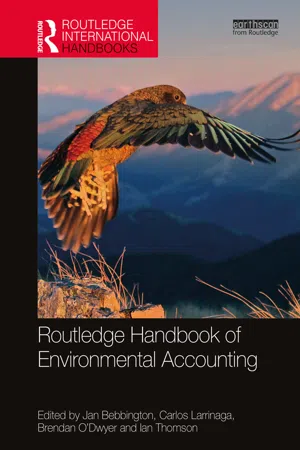
Routledge Handbook of Environmental Accounting
- 414 pages
- English
- ePUB (mobile friendly)
- Available on iOS & Android
Routledge Handbook of Environmental Accounting
About this book
This handbook showcases the broad spectrum of diverse approaches to environmental accounting which have developed during the last 30 years across the globe.
The volume covers a range of physical issues such as water, carbon and biodiversity, as well as specific accounting matters such as management control, finance and audit. Moreover, seven chapters present environmental accounting issues that arise in the regions of Africa, Asia, Europe, MENA, North America, the Pacific and South America. The handbook also highlights future challenges in all the topic areas addressed as well as introducing new topics, such as links between environmental accounting and the circular economy, and the issues associated with animal rights. Edited by leading scholars in the area and with key contributions from across the discipline, and covering a diverse range of perspectives and locations, the volume is divided into five key parts:
• Part 1: Framing the issues
• Part 2: Financial accounting and reporting
• Part 3: Management accounting
• Part 4: Global and local perspectives
• Part 5: Thematic topics in environmental accounting
This handbook will act as a significant publication in drawing together the history of the field and important reference points in its future development, and will serve as a vital resource for students and scholars of environmental accounting and environmental economics.
Frequently asked questions
- Essential is ideal for learners and professionals who enjoy exploring a wide range of subjects. Access the Essential Library with 800,000+ trusted titles and best-sellers across business, personal growth, and the humanities. Includes unlimited reading time and Standard Read Aloud voice.
- Complete: Perfect for advanced learners and researchers needing full, unrestricted access. Unlock 1.4M+ books across hundreds of subjects, including academic and specialized titles. The Complete Plan also includes advanced features like Premium Read Aloud and Research Assistant.
Please note we cannot support devices running on iOS 13 and Android 7 or earlier. Learn more about using the app.
Information
Part 1
Framing the issues
1
Curating environmental accounting knowledge
Introduction
- describes the nature of the problem that environmental accounting seeks to address (including a consideration of the social aspects of environmental change);
- outlines the practice and other academic partners who have strengthened environmental accounting research;
- considers how future accountants might become ecologically literate, focusing on the role of accounting education (in universities and professional training/continuing education); and
- provides some reflections that emerge from having read the handbook as a whole and which may provide a glimpse into some of the contours of future environmental accounting.
Defining the problem arena
Environment and accounting linkages
Table of contents
- Cover
- Half Title
- Endorsements
- Title Page
- Copyright Page
- Dedication
- Contents
- List of figures
- List of tables
- List of contributors
- Preface
- Part 1 Framing the issues
- Part 2 Financial accounting and reporting
- Part 3 Management accounting
- Part 4 Global and local perspectives
- Part 5 Thematic topics in environmental accounting
- Index